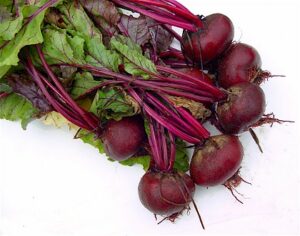 A beetroot is a vegetable with deep purple roots. These can be eaten raw or cooked, and the green leafy part of the beet is also edible. The beetroot contains a unique group of antioxidants called betacyanins, which help to give them their vibrant colour and medicinal benefits.
A beetroot is a vegetable with deep purple roots. These can be eaten raw or cooked, and the green leafy part of the beet is also edible. The beetroot contains a unique group of antioxidants called betacyanins, which help to give them their vibrant colour and medicinal benefits.
This study states that – beetroot appears to be a powerful dietary source of health promoting agents that holds potential as therapeutic treatment for several pathological disorders. (And).. in the human studies to date, beetroot supplementation has been reported to reduce blood pressure, attenuate inflammation, avert oxidative stress, preserve endothelial function and restore cerebrovascular haemodynamics.
Benefits of Beetroots
There are many great benefits of Beetroots, the main ones are:
Liver Support – The phytochemicals contained in beets, help to stimulate the production of glutathione – which is a detoxifying antioxidant, that combines with many other antioxidants pigments to aid and support liver function. This process also benefits toxin removal from the body.
Nourishes the Blood – The combination of antioxidants and iron, aids in nourishing and supporting the blood as well as improving its oxygen uptake.
Heart Support – Its antioxidants may help to normalize or lower cholesterol – as this study has indicated, with the use of red beet leaf in mice fed a high fat and high cholesterol diet. There are also indications that a daily glass of beetroot juice may decrease high blood pressure, due to the inorganic nitrate found in it. This study concludes that – inorganic nitrate has proven time and again to be effective in reducing blood pressure in healthy individuals, and largely successful in reducing blood pressure in hypertensive patients.The B vitamins found in it may also improve nerve function, helping to maintain a strong, regular heartbeat. 
Improves Exercise Performance – The natural nitrates found in beetroots have been shown to improve exercise performance, as this study on running performance indicates.
Aids Digestion – Beetroot leaves are even more nutrient dense than the root. They are rich in vitamin k, which is necessary for bone and blood health. They also contain beta-carotene, which is imperative for good skin and healthy eyes (as well as other things). The leaves eaten raw in salads, act as a bitter digestive aid.
Anti-inflammatory – The betalains (red and yellow pigments) contained in beets, have exhibited anti-inflammatory actions upon the body. They have many wonderful health benefits, including detoxification support.
How to Use
Beetroots can be eaten fresh, cut or grated in salad. They can be lightly steamed or roasted as a side dish. Fresh beets will cook faster, helping to retain the essential nutrients. They can be juiced or blended into a smoothie, with other vegetables such as carrots and celery. The leaves can be added to salads, to provide an added boost to health.